June 10, 2020
Black Writers Matter

I don’t recall the catalyst for my decision to make a point of seeking out Black women authors in my reading (it might have been The Turner House, by Angela Flournoy), but only that I kept on doing it because the rewards were plenty. And I too have been frustrated by a lack of Black female voices in Canadian literature, which critic Donna Bailey Nurse addresses here, mostly because if the American example is any indication, then CanLit is missing out on so much—although there have been incremental changes on this front and I can now list Black Canadian women authors on more than one hand. (Note: this is still not enough, thank you.)
And in the last two weeks since the murder of George Floyd, as many white readers and white bloggers have been made suddenly conscious of the lack of diversity on their bookshelves (or cringe-worthingly hyper conscious of what diversity is there—yikes. Stop it, guys!), I’ve thought about posting a list about the Black writers I love, and the reason I’ve decided to partake in this kind of performance is because I’ve not written about so many of those books here on my blog, posting on the far more ephemeral Instagram instead, and so much gets lost that way.
And also because at this moment when so many readers are looking to add Black writers to their to-be-read lists, I can offer many excellent authors and books to start with—because this is only the beginning.
June 9, 2020
Gleanings

- If you’re not a person of color, please read this.
- I should say: I never intended to become a spy.
- What does a story about a verandah in the1930’s have to do with COVID19 social distancing?
- The firehose of love for mothers left me in the dark…
- Between walking and sitting, between exploring and absorbing, this generation is shaping themselves to guide the future.
- I see glimpses of a great awakening in these times, and I hope it’s true.
- Death is weird. The ultimate fake out.
- Letter from a white home, to other white people
- I am not great at metaphors, but I think living through 2020 is turning out to be much like that vine.
- I love coincidence because it makes us see patterns that aren’t there. I’m pretending this is part of some grand plan I’d unconsciously made for myself.
- So yes, say something, but also: Pause. Know when to listen.
- When I am swimming, the water ruffled by wind, no one else on the shore but my husband wrapped in a towel, it could be any summer, any lake, any morning.
- In praise of heroes…
- 7 books by Black poets I think you’ll love
- So that’s how my week is going–how my weeks are going, as they blur together, weirdly ephemeral and indistinct but also somehow relentless, a foggy procession through time.
- We talk about our culture because we are white and it is important to talk about whiteness, and what it means in the world: it means that we are safer, and we are heard, and that we always have the benefit of the doubt.
- On notice
June 8, 2020
Let’s All Take Care

There was a moment when “this all” started when everything felt particularly tender, when “care-mongering” became a thing and everyone was very scared, and I’d never felt more connected to others, to the people in my community and all around the world. And while people have continued to take care in so many ways since then, the general sense of goodwill seems to have evaporated around Week 6, and I get it. It doesn’t sound hard, what those of us who aren’t really going through anything are all going through. Stay home, work from home, carry it, plank the curve—it sounds doable. It is doable, because we’re doing it, but also nobody is bringing their best self these days. I don’t know if people have never been more irritating or I have never been more irritable, and the answer is a knife edge. I’ve unfriended people on Facebook, one person before I delivered a message to “Go fuck right off,” which is not the usual way I conduct myself, on Facebook or anywhere, but I’ve got no patience these days. There is nothing in reserve. I am a relatively stable person with a lot of support, and I was at serious risk of falling apart last week, several times. And if I’ve been struggling, what about all the people without people to hold them up, without the comforts and luxuries that I can count on, people with a history of trauma and mental illness. This collective devastation: never in my memory has there been anything else like it.
It’s too big even for a hashtag (WHICH, ADMITTEDLY, IS FINE).
Do you feel it too, that brittleness, everything so fragile? That care-mongering might be more necessary than it was 12 weeks ago? That even though our devastation is collective, that none of us really has any idea what the other is going through? I am relieved to be feeling so much better after last week’s struggle, but I know that it continues for so many others, and that getting through it is going to have to be collective too. We need compassion, and patience, and understanding, and empathy. We need to stop being furious at our neighbours for wearing masks/not wearing masks/for having playdates/for their furious social media tirades about people having playdates. We need to stop taking our collective helplessness out on each other.
And it’s not even hopeless. It’s been time since I’ve been able to say such a thing with confidence, but it isn’t. And maybe it’s the brittleness, the fragility, the rawness of our hearts right now that made the fact of George Floyd’s torture and murder at the hands of police resonate all over the world. That has made those of us who aren’t Black begin to viscerally understand the pain and brutality of racism in new ways, to ask questions we might not have ever considered before. That same impulse, edginess that led to “Fuck right off” and the Facebook unfriendings are the same rage compelling people to the streets. The pain is everywhere, and it’s spilling over. A river. An ocean.
All we have is each other. Let’s take care.
June 4, 2020
The Trouble With Memes

On Tuesday morning, Instagram went black. User after user started posting black squares in support of the fact that Black people deserve freedom from violence and murder by police, and this came a week after the murder of George Floyd in Minneapolis, a day after corporate brands were busting out all over with their support for the Black Lives Matter movement, when the reasonable suggestion was being made by many that right now was a moment where white social media influencers could “mute” themselves, taking a step back from their platforms to amplify the voices of Black leaders instead. In the music industry, two Black women—Jamila Thomas and Brianna Agyemang—had already launched #TheShowMostBePaused for Tuesday June 2, an initiative to show that they and others in music would “not be conducting business as usual without regard for Black lives.” And somehow this idea was spilled beyond their industry and over onto Instagram in general, utilizing the symbolism of the black squares, and users began adding the Black Lives Matter hashtag…because Black lives do.
But the effect of this proved disastrous, and because influencers are gonna influence, the effect was also huge. By Tuesday morning, the Black Lives Matter hashtag (essential for organizers and activists) was lost to a sea of dark squares, the noise of well-meaning white people’s efforts to be quiet. Though of course not everyone was white, and there were many Black people who were also part of the meme too, no matter how it absurd it may seem that any Black person should be silent at a moment when Black voices have never mattered more.
But this is how memes work. There is a sense of obligation, in addition to one of reflex, and of course, it’s easy. Although it’s not as easy to share a meme on Instagram as it is on other platforms, where sharing and retweets are built into the system. (They weren’t always. Once upon a time, pre the RT button, one had to go out of their way to share on Twitter, copying and pasting in order to post other people’s content.) On Instagram, users require a external reposting app (or screenshot captures) to share posts beyond the ephemerality of Instagram Stories—and this extra step required is why Instagram has long been my social media platform of choice. The extra step creates enough friction for users to be more thoughtful about what they’re posting, and it also makes it less trouble to post original content, something users have created themselves.
(This does not mean that Instagram is an intellectual oasis. But sometimes, it’s one of the less stupid sites on the internet I see.)
The black squares were so simple though, their symbolism poignant, and the matter was urgent with real lives at stake—so I understand why someone would leap on the bandwagon without thinking. And it’s not so much this particular bandwagon that I am critiquing here, because the fallout was dramatic enough to be obvious, but instead I want to critique the “without thinking” itself, which is the essence of meme culture and meme activism, undermining political messaging and making the internet a much less interesting place.
Of course, memes work. Right wing movements owe much of their success in the last five years to garbage social media accounts stating simplistic or misleading ideas, and demanding that your great uncle share if he agrees, which he does, and he did, and this is probably why some of you quit Facebook. More recently, however, progressive groups have tried similar approaches, which is why your enlightened uncle on the other side is sharing posts from “North 99,” which means that your Facebook feed is a little bit less racist, but it certainly isn’t any less dumb.
But what would an internet without memes even look like? And here I will hearken back to the glory days of blogging, to the first five years of this century when most people were barely online. Where instead of social media and algorithm, we had blogs instead, where everybody was a different kind of social misfit, and everything was a little bit technically clunky. If you wanted to put something online, you would have to write it in your own words, instead of borrowing somebody else’s—unless maybe they were the lyrics to a Dar Williams song.
Now this kind of nostalgia is as substantial as a meme is, so I’ll stop here, but I share it to show you where I’m coming from, the kind of “interesting” I’m looking for when I’m scrolling around online.
What if you believed in the power of your own words and ideas to speak up and make a difference? Just think of what kind of power that could be. What if, instead of a black square, you shared an image from your field of expertise and wrote some paragraphs about your thoughts on racial violence from your perspective as an art appraiser and as a parent? What if you curated your feed into a gallery of Black voices? What if you posted a picture of the view from your window, accompanied by a sentence or two about how that view looks different to you now that you have a new understanding of the murderous brutality of police violence? How does your sky look different today because of that? I’d really like to know. (And you don’t even have to tag your Black friends in this post, because none of this, to them, is news.)
What if it wasn’t even about what you posted, but instead about what was in your mind?
And if you weren’t ready to share that yet, if you still had learning to do, instead you could sit back and listen?
June 3, 2020
Thoughts about Being Okay
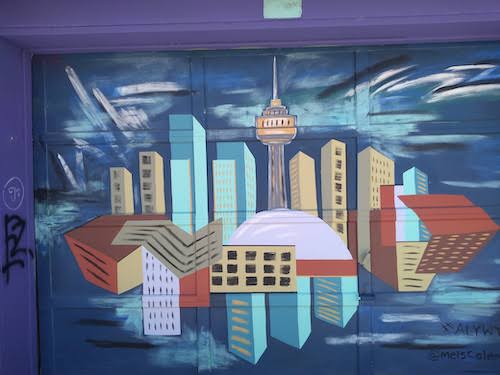
I started having panic attacks again on Monday, the kind I was having back in March when “all this” began. I’d been feeling sad and overwhelmed since Thursday, on Saturday our summer holiday got cancelled, and that afternoon helicopters circled the sky as protesters took to the street to stand up for Black people’s lives and the roar of those machines was dark and ominous. The scenes in the US were getting more and more upsetting, and Monday ended with news of the US “President” assembling troops to attack citizens in the street, and also peaceful protesters being cleared with tear gas so that dipshit could pretend he was going to church. (Dude did not know it was Monday.)
I was trembling, my heart was palpitating. I knew I was going to be in some trouble, and so after my children were in bed, my husband and I sat down to talk and try to calm me down, which helped a bit, but it still wasn’t finished, and the only way out of panic, I’ve found, is through. My mind so highly strung, and I was scared. We have a fan in our room, for ventilation and white noise, and I started imagining I was hearing the sounds of more helicopters. Trying to convince myself otherwise, but I was lying in bed awake for hours, my mind a million miles and hour, and it was the sound of people shouting and screaming I heard next, and what was happening outside? To this world?
I got up to find out, and went to the window, where perspective shifted—and I realized the sounds I was hearing were birds. I’d been up so long that the birds were awake. And the fact that birds were singing was a lulling thought, this ordinary thing instead of the nightmare I’d been imagining. And I fell asleep finally sometime around 4 am.
Spending the next day bleary-eyed and with a headache, the panic still there, and it was hard to function. I barely did. And then the panic was finished, and I still was tired, but I was calm again, and there was light to see, and the birdsong was birdsong, and world a place I recognized. Such relief in that—euphoric, even. Like an illness and the absence of pain—I was so glad to be through it.
But of course it’s not over. I feel okay again, but it’s not okay again, and I don’t think it ever has been. I was thinking too about how it’s important, perhaps even essential, for white people to feel uncomfortable. And how the greatest reason for my fear when I’m overwhelmed is usually connected to my children, my fears for this world into which I’ve brought them. And the lightness of my imaginary helicopters when compared to the concrete fears of other parents for their own Black children, to feel like that all the time. The people for whom the sounds don’t turn out to be birdsong.
I get relief from my fears—I acknowledge the privilege in that, and how different my experience is from those of other parents all over the world, in my city, even. I get to feel better, which is not a bad thing, because my panic was debilitating, short of rendering me unable to function. But the point is that now that it’s done, I need to remember that my feelings are not the end of the story of inequality and injustice, of battles that are still going on and which we need to be fighting regardless of what I’m going through.
But also that I can be okay when things are not okay, and that is okay too.
June 1, 2020
Calm Is Still a Superpower
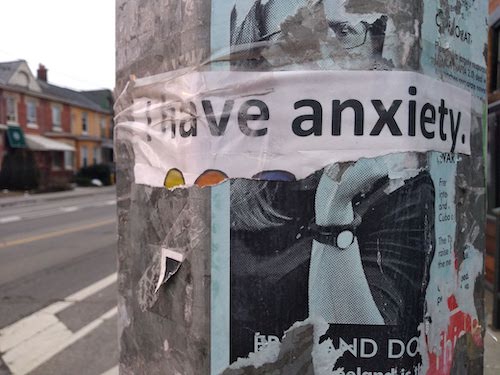
It was my fault—all of it.
Do you do this too? Do you have a whole host of reasons why the disastrous spring of 2020 was a product of your own consciousness? Covid-19 has got me out of both jury duty and a colonoscopy, and it’s crossed my mind that I’ve likely engineered all this, my ability to control the universe gone terrifically awry. (I am sorry.)
But the worst of my crimes was this blog post, the one I published on February 21, when I wrote about how after months and years of freaking out over everything (natural disaster, WW3, and mass slaughter, and every theoretical terrible thing), I finally accepted that nothing TRULY bad was really going to happen and calmed down. And even though unrest and instability, war and tension continued throughout January and February, I met it with my Zen approach, because I’d mastered consciousness, and was basically a yogi.
And then the universe said HA.
Or it didn’t, because the universe isn’t so responsive, and I don’t actually reside at its centre (so I’ve been told), but for a long time, I thought of my February blog post and felt sick to my stomach. When I’d been feeling sick to my stomach anyway, because there was a whole week in March where I couldn’t eat for a week, or sleep, or even sit down and look at a puzzle without having heart palpitations—and that I was looking at a puzzle at all is indicative of how bad things were at. I am not a puzzle person, but I couldn’t even read.
I thought I’d figured out anxiety. What a lark! And that was back when I only had abstract notions to be anxious about, when I could shop for groceries or take my children to school without fear of a deadly contagion. When the President of the USA wasn’t sanctioning police violence in the streets. It seems laughable now.
And yet, the answer is the same. And at least I wasn’t giving a prescription in my February post and I acknowledged there was uncertainty, a wavering—I’d never really claimed to have mastered anything. But I was observing a point in my process instead.
“None of it’s simple,” I wrote, “and the only way toward an answer is work, which is what’s happening now all around us, and we need to be patient. And calm.”
Which doesn’t mean passive. It doesn’t mean waiting and doing nothing, and eliminate the necessity of action, but instead.
It means breathing. It means grounding. It means thinking, and listening, and connecting, and learning, and (in the words of Ann Douglas) calm is still a superpower.
Maybe more than ever.
June 1, 2020
From My Mother’s Back, by Njoki Wane

Want to support a Black Canadian writer releasing a book this spring? Pick up Njoki Wane’s rich and generous memoir From My Mother’s Back, a story that weaves her childhood in rural Kenya with her current experiences as a professor at the University of Toronto, showing the long journey she took to meet her goals, but also how these two parts of her life are deeply connected, and informed by her strong bond with her siblings, her parents, especially her mother, and her ancestors.
Wane writes about the view from her mother’s back as her mother showed her the world, about losing her name and connection to her culture as she attended Catholic boarding school, her passion for learning and teaching, and what it means to be Black in Canada (“It’s like there’s a story written on my skin that I’m not allowed to read.”)
There is wisdom here, as Wane writes of overcoming hardship and also of her struggles. “These are the moments that shape us; these are the memories that carve our future from the woodwork of possibility. Struggle and challenge, appreciation and gratitude narrow our focus define our values and provide us with stillness necessary for grounding.”
It’s a wonderful, inspiring and hopeful read.
May 28, 2020
Terrible and Fine
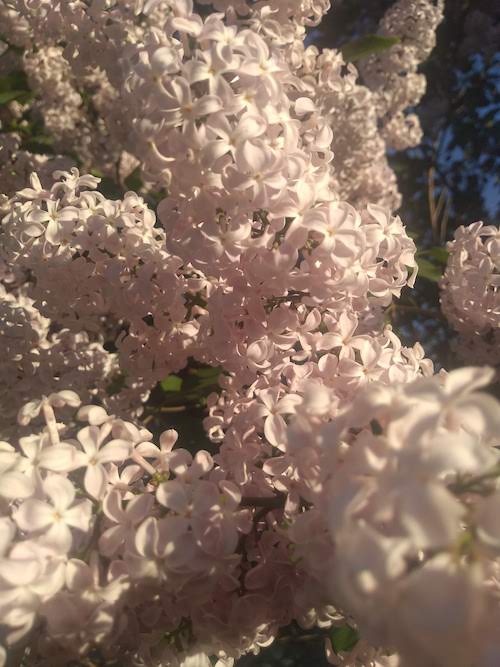
I can never understand how difficult a moment is until it’s over, which is useful as far as self-preservation mechanisms go—though it might be hard for other people to understand, people who prefer to confront the darkness head on. I imagine those people find my social media posts annoying, everything crumbling, and my insistence on noticing daffodils. But I cannot look at the darkness, instead walking through it in a fog, squinting and imagining that I’m discerning silver linings, and the fog is what’s keeps me going. The fog and the hope, because otherwise I can’t get up off the floor, and it’s doubly convoluted because this crisis, for me and my family, is abstract. Our home is comfortable, we still have our incomes, my children’s needs are met, we’re healthy, and we can afford to stay home and stay safe, meanwhile the weather is glorious, and potato plants are coming up in my garden, and there are wildflowers everywhere—lilacs, peonies, and irises, so much abundance, and so where is the crisis? Whereas if I walked twenty minutes east, I’d encounter homeless encampments, but they’re not on my route. And if I walked by them, would I even see them? How would I make them part of the story I tell?
I cried this morning when the school principal made an appearance on Iris’s class meet-up. Yesterday I scrolled through my Instagram account from the last few months, which is rich with colour and beautiful things, but I knew those images were standing in for sadness and hard feelings (and if you read the captions, this is often the case. I am not entirely delusional). It’s been a terrible few months. It’s also been fine. And how the mind struggles to know both these things at once.
May 27, 2020
Spring Books on the Radio
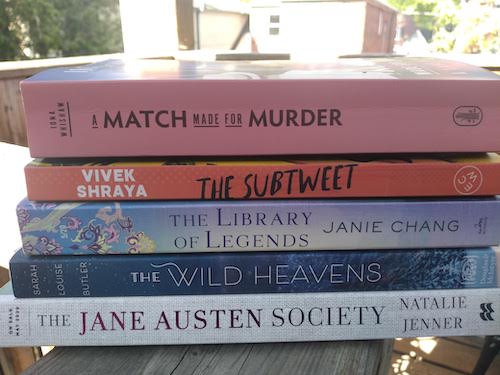
Today I had the pleasure of talking about these gorgeous books today on CBC Ontario Morning: a charming mystery, a breezy but cutting book about friendship, a book that delves into part of Chinese history I’d never heard of before, and the most philosophical book about Bigfoot that you’ll ever read. I ran out of time before I was able to recommend Natalie Jenner’s novel, The Jane Austen Society, which came out yesterday, and if I’d had the chance, I would have told you that it”s a delightful escape from reality, a heartwarming story of how books and community can save us in our darkest days. A lovely hammock read!
May 26, 2020
Gleanings
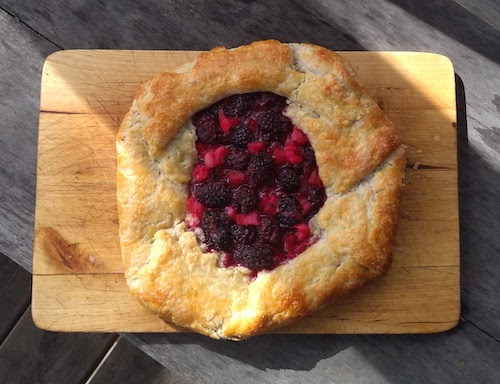
- It’s time to resist the siren call of pie season and make a galette instead.
- At my desk, in the night, I was thinking about rumours.
- Having the decision made for me by circumstances hasn’t changed everything about how I feel about teaching online, but it has made a lot of those feelings irrelevant.
- What I know about kitchens, is that we make them work, even when they don’t make sense.
- The world is opening up, meaning that we’ll have to see each other again. Get to see each other. My bad.
- And yesterday, I was reminded that all writing starts somewhere, and a sense of wonder–both in the sense of “awe” and in the sense of “curiosity”–is a great starting point.
- when I do get the urge to sew, and when I’ve gotten out all of the things, I binge like a run-on sentence
- Probably I would have melted down by now, but it’s the flowers keeping us going.
- Do you keep a book on your breakfast table and read it in the morning?
- A diary of the mundane and (some of) what we ate.
- what do you think will happen?
- I realize as I do this that I am more interested in the process than the result.
Do you like reading good things online and want to make sure you don’t miss a “Gleanings” post? Then sign up to receive “Gleanings” delivered to your inbox each week(ish). And if you’ve read something excellent that you think we ought to check out, share the link in a comment below.





